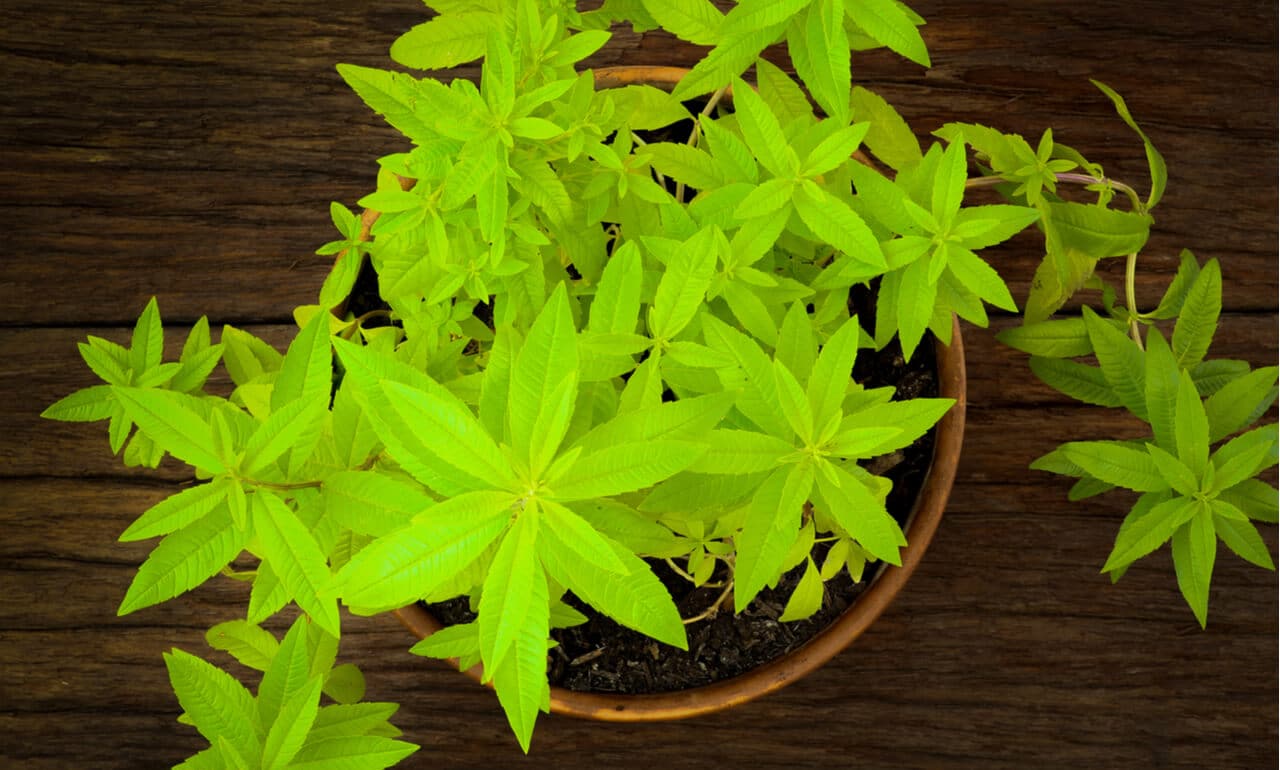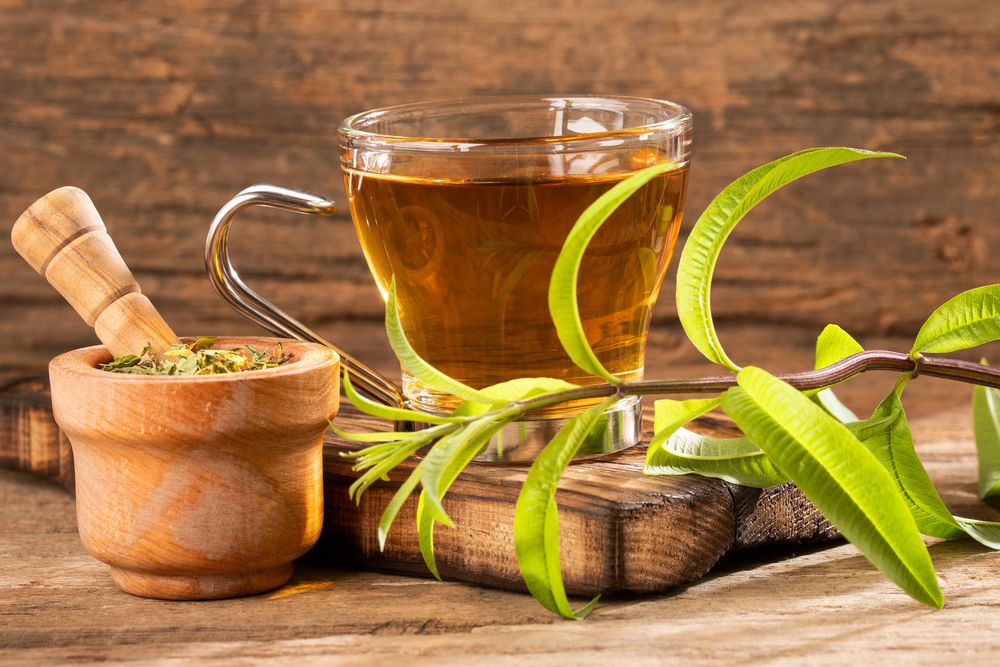[ad_1]
You might think that Lemon Verbena is a part of the citrus fruit family popularly known as lemons. But that’s not quite the case. Lemon Verbena is a flowering plant which is otherwise known as Lemon Beebrush. Although Lemon Verbena is not directly associated with the citrus fruit family, it shares a similar aroma and taste to some extent. As a result, its usage is spread far and wide, from being used as an ingredient in herbal teas and alcohol to fragrance in exotic perfumes. However, since it is similar to green tea, lemon verbena is mainly used is to make tea.
Lemon verbena leaves are jam-packed with many polyphenolic and other plant-based compounds. Polyphenols act as antioxidants and help protect against various diseases and oxidative stress. Although it is native to the South American continent, people worldwide profoundly use lemon verbena. In addition, the medicinal and aromatic qualities of lemon verbena have helped its commercial use expand over parts of Europe and Asia.
Characteristics and Nutritional Properties
Lemon verbena is a perennial shrub that can be 2-3 meters tall. It is dressed with glossy pointed leaves that may leave a distinct lemonish aroma when rubbed. These leaves can be anywhere between 6-9 centimetres long and abrasive to touch. Although potted lemon verbenas may not blossom, sprays of tiny purple or white flowers develop in late spring or early summer. In tropical climates, it is evergreen. However, it is cold-tolerant, shedding leaves at temperatures below 0°C. People often recognise and sell it as a plant for the herb garden due to its various culinary applications.
Lemon verbena does not have any carbohydrates, proteins or fat content. However, it is rich in polyphenolic compounds, beneficial for the human body. It contains:
- Geraniol: 17%
- Verbascoside: 11%
- Citral: 14%
- Nerol: 11%
These are some natural antioxidants that you can find in this herb.
Health Benefits of Lemon Verbena
People have been using lemon verbena for generations to treat muscular spasms, reduce fever, act as a sedative to indigestion, and promote appetite. However, the most common health benefits are as follows.
Aids Weight Loss
Lemon verbena can have an anti-obesity effect on the body. For example, research demonstrated that using lemon verbena extract helped reduce fat accumulation and improved the ratio of gut microbes.
Another study of 54 people found that taking daily supplements with lemon verbena and hibiscus extracts reduced the hunger pangs. In addition, it reduces a hormone called ghrelin and increases peptide production that gives the feeling of fullness.
While green tea is the preferred weight-loss beverage, tea brewed from lemon verbena leaves can be used as a great alternative. Since the calorie content is close to none, you can drink it at any time during the day. It can prevent snacking between meals. Also, as per research, lemon verbena helps lower appetite by influencing appetite-controlling hormones.
Helps in Muscle Conditioning
One of the unique herbal properties of Lemon Verbena is that you can use it as a workout supplement due to its high antioxidant content. According to studies, high antioxidant qualities reduce muscle damage during workouts and allow your body to generate stamina. It can also help protect your cells from damage and is particularly beneficial for athletes as exercising can cause muscle damage and oxidative stress. As a result, lemon verbena can be a part of the pre-or post-workout supplement regime.
Including lemon verbena in your diet can help strengthen your muscles. It is a safe source to heal weak or damaged connective tissue. In addition, it can help tone your muscle and eliminate lactic acid. It also works as a painkiller when you use it as an essential oil. You can use this essential oil to massage the muscles.
Acts as a Remedy for Throat Issues
You can use lemon verbena leaves to alleviate the discomfort of respiratory congestion and a sore throat. In addition, the plant can help cleanse the respiratory system by acting as an expectorant. It also helps decrease throat irritation and cure bronchitis caused by an irritated bronchus.
Sterilises Wounds
When lemon verbena leaves are put directly onto an open wound, they can assist in sterilising it by killing germs and avoiding infection. It is due to lemon verbena’s anti-inflammatory qualities. According to research, it can help prevent future wound aggravation and ease burns and itching.
Improves Joint Functioning
Verbascoside is the principal chemical component of lemon verbena herbal tea. It’s the substance with the highest health advantages. When combined with omega-3, this potent anti-inflammatory chemical can considerably increase joint mobility. The findings of a study involving 45 patients who took lemon verbena pills with fish oil showed that the supplements reduced joint discomfort.
Improves Digestion
A cup of warm lemon verbena tea can be beneficial in keeping the digestive system healthy. People use DIY home remedies containing lemon verbena to alleviate intestinal spasms and gastric pains. It can also help relieve abdominal cramps and ward off nausea and indigestion.
Lemon verbena tea may increase the population of the good gut bacteria in the intestines. These gut bacteria help digest the food more efficiently and increase the absorption rate of various minerals and nutrients. You can also use it to treat upset stomachs and prevent gastric distress.
Lemon verbena is a common natural remedy utilised by many ancient societies. The use is still prevalent in current times. The herbal ingredients can help relieve stomach pain and gastrointestinal difficulties, including cramping and bloating.
Improves Sleep Quality
Lemon verbena may aid people with sleep problems like insomnia. The herb helps cure sleeplessness and makes you sleep. As per a study, participants who consumed lemon verbena before hitting the bed experienced a better ability to sleep, improved sleep duration, sleep quality and daily weariness than others.
Improves Immunity
Lemon verbena contains antioxidants and anti-inflammatory compounds, which can help reduce oxidative stress and inflammation. Free radicals cause oxidative stress as they bind to the free oxygen in the body, depriving the healthy cells of fresh oxygen. Antioxidants fight these free radicals and eliminate them from the system, decreasing oxidative stress.
People with progressive multiple sclerosis (MS) were given lemon verbena extract for 28 days during a study. The study observed that lemon verbena significantly lowered the levels of inflammation related to a particular protein.
Improves Psychological Health
The scent of lemon verbena may help improve concentration and increase your focus. You can use lemon verbena essential oil for aromatherapy. In addition, it can help to relax your mind and ward off stress and anxiety. According to a study, it can positively affect anxiety and calm it down.
Lemon Verbena: Usage
You can add lemon verbena to your diet in several ways. However, the best way to use it is by making lemon verbena tea. There are several other ways to use lemon verbena.
Garnish And Dressing
Lemon Verbena is a versatile plant that works well in sweet and savoury preparations. The young, sensitive leaves can be thinly sliced and used raw in pestos, salsas, vinaigrettes, and meat marinades, or put into salads, blended into soups, or used as a seasoning in ceviche.
Used in Aroma Industry
Essential oils from lemon verbena are related to a popular herbal treatment with a refreshing smell. It can provide a wide variety of possible health advantages when taken appropriately.
Lemon verbena has a refreshing and calming scent that acts as a natural air freshener. You can use some leaves and put them in a small bowl of water in the room to spread the natural scent. What could also work is if you also take some leaves of lemon verbena and soak them in water, put them in a spray bottle and use it to spray around the room to give it that fresh lemony smell.
You can also use lemon verbena essential oil in an oil diffuser for the same purpose. For example, you can do this for aromatherapy. Likewise, adding a few drops of lemon verbena essential oil to your bathwater or natural cleaning solutions can be suitable for aromatherapy.
Using Lemon Verbena for Skin Health
You can also use some lemon verbena oils to calm down inflammation for skin conditions. But it is imperative to do a patch test first to see if you are not allergic to the plant extracts as it can worsen the situation.
Other Uses
You can use some lemon verbena leaves to add to the laundry. It will give your clothes freshness and add a mild scent to the load. In addition, you can use lemon verbena leaves to make tea or include some other herbs and boil them to make detox water.
Healthy Recipe Using Lemon Verbena
Lemon Verbena Tea
The most common usage of lemon verbena is through its leaves that you can use to make the infamous lemon verbena tea.
- Serves 2
- Preparation Time: 7 minutes
Ingredients:
- Mint: 18-20 leaves
- Lemon Verbena: 12-15 leaves
- Water: 2 cups
Method:
- Add water to a pan and bring it to a boil.
- Pour the hot water over the leaves and let it steep for 4-5mins.
- Strain the tea separating the leaves from the water.
- Serve hot.
Precautions
The list of possible adverse effects of using lemon verbena isn’t very lengthy. However, an allergic reaction can be a response specific to each individual.
You should refrain from using lemon verbena if you have renal problems. It may eliminate these issues and harm the kidneys.
Before using lemon verbena topically, it is essential to do a patch test first and see if you are not allergic. If you are allergic, it can cause breathing problems, skin irritation, hives, watery eyes, runny nose etc.
If you want to take lemon verbena as a supplement, check in with your physician first to see if there can be any side effects or that it won’t interfere with some pre-existing conditions.
Some people believe that pregnant and breastfeeding women should avoid consuming lemon verbena as it can have side effects. However, as long as you keep monitoring the intake of lemon verbena, there is no reason to worry. You can freely enjoy the health benefits it provides.
Conclusion
Lemon verbena is a plant that boasts a plethora of health advantages. For example, it can reduce oxidative stress, increase cell life, improve sleep, and recover muscle damage. In addition, it can also have some weight management effects on the body. Therefore, the food industry frequently utilises it. It’s an old herbal treatment that many people still take. This miracle plant has a wide range of applications and may be eaten raw or cooked. The most popular way to consume it is by brewing tea from its pointed and scented leaves. However, you should always be careful while using plant extracts for DIY use and always do a patch test to avoid allergic reactions and complications.
Many brands and companies sell lemon verbena products. As a result, you may need to identify a dependable and respectable supplier and make sure you’re buying organic and natural products to healthify yourself.
Frequently Asked Questions (FAQs)
Q. What are the benefits of lemon verbena tea?
A. There are various benefits of lemon verbena tea. These include helping in weight loss, improving digestion, and muscle strengthening. In addition, the lemon verbena leaves that we use to brew tea has several other health advantages for the skin, nerves and immunity.
Q. Can you drink lemon verbena?
A. Yes, you can drink lemon verbena by brewing tea out of its leaves. In addition, you can use lemon verbena leaves to prepare detox water to flush out toxins from your body. People also use essential oils made from its essence. However, their way of consumption may vary.
Q. Does lemon verbena help you sleep?
A. Yes, several studies have shown that lemon verbena can improve sleep quality in many aspects. For example, it increases your sleep duration, gives you sound sleep, and improves the ability to fall asleep. In addition, plant extracts have been used throughout history to treat insomnia and induce very mild sedation.
Q. Can you eat lemon verbena leaves raw?
A. Yes, you can consume them raw. Therefore, people use them for garnish and dressing in various cuisines. You can either eat the leaves or peel them off as you eat.
Q. What is verbena good for?
A. Lemon verbena is good for digestion, weight loss, and muscle building. It is also anti-inflammation and promotes joint mobility. In addition, it has neurological benefits as it helps induce sleep, calms your nerves and enables you to relax.
Q. What vitamins are in lemon verbena?
A. Lemon verbena does not contain too many minerals and vitamins. However, it is rich in vitamin C. It is also a rich source of chemical compounds like carvone, linalool, and cedrol.
Q. Is lemon verbena a diuretic?
A. Yes. It can be a diuretic. However, there are better alternatives as there is insufficient research about lemon verbena’s use as a diuretic.
Q. Is lemon verbena good for your skin?
A. Yes, lemon verbena is good for your skin. It creates a soothing, healing, and toning impact. I addition, it contains powerful antioxidant enzymes which help reduce acne and puffiness around the eyes.
Q. Is lemon verbena good for hair?
A. Yes, lemon verbena is good for hair due to its chemical position. It may aid in the strengthening of hair and instigating growth. It is also one of the ingredients in ointments and lotions to lower irritation and skin reddening.
Q. Is lemon verbena good for sore throat?
A. Lemon verbena is suitable for a sore throat due to its anti-inflammatory properties. It is helpful for removing the uncomfortable feeling. In addition, it can relieve congestion in your respiratory system.
[ad_2]
Source link



